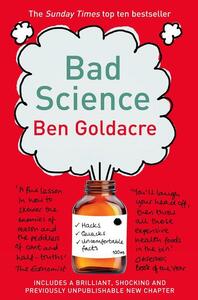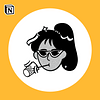You need to sign in or sign up before continuing.
Take a photo of a barcode or cover
Everything said was true but it was a bit dense and the writer seems a bit like a know it all so I’m taking one star off
More accessible than Bad Pharma but just as informative. It really makes you question all the science stories you see perpetuated in the media, their amazing finds and wild statistics, and makes you want to scream 'BULLSHIT' at everything that isn't properly verified and studied. It's an educational read that most people would benefit from.
I told my physio that my husband was reading this book. She said, 'Oh that is a wonderful book, you must read it when he is done.' Husband is done. So I'm reading the book.
Edited now that I've read it: Definitely time worth spent. Glad to have read it. Hope South Africans get themselves a copy too.
Edited now that I've read it: Definitely time worth spent. Glad to have read it. Hope South Africans get themselves a copy too.
I think I have to explain my rating for this book...
I really liked that on the example of some health and nutrition myths was shown how people selling those products/services use something that looks like science and isn't to convince people that it works and is worth their money.
Ben Goldacre picks things apart and shows the reader how to spot the bad pseudo-science that's used by those people.
Then he moves on to big pharma companies and the media. Again, I liked how he showed that things get blown out of proportion and how they get presented in a way that makes people believe in them.
But - he keeps repeating himself, parts of the book felt like a rant against a certain person/health myth or whatever that chapter was about. And apart from the epilogue I got the feeling that he thinks that most journalists are uneducated, lazy people.
That's why I only give the book 3 stars, I enjoyed the facts in there and some of the sarcastic comments had me laugh out loud - but I didn't like the rants and repetitions and judgemental treatment of whole professions.
I really liked that on the example of some health and nutrition myths was shown how people selling those products/services use something that looks like science and isn't to convince people that it works and is worth their money.
Ben Goldacre picks things apart and shows the reader how to spot the bad pseudo-science that's used by those people.
Then he moves on to big pharma companies and the media. Again, I liked how he showed that things get blown out of proportion and how they get presented in a way that makes people believe in them.
But - he keeps repeating himself, parts of the book felt like a rant against a certain person/health myth or whatever that chapter was about. And apart from the epilogue I got the feeling that he thinks that most journalists are uneducated, lazy people.
That's why I only give the book 3 stars, I enjoyed the facts in there and some of the sarcastic comments had me laugh out loud - but I didn't like the rants and repetitions and judgemental treatment of whole professions.
A good book, even if the author sounds patronising at times. It shows why so many people are so angry about "alternative medicine" quacks, and what's so wrong about that whole thing. To tell the truth, I didn't really see a great problem arising from alternative medicine. This book has some pretty grim and drastic examples of such problems, putting whole problem in a very good perspective.
This book has a lot of interesting, valuable things to say about 'Bad Science' - exploring how people call themselves doctors despite no relevant qualifications (Gillian McKeith) to the way science stories are portrayed in the media (the MMR controversy). The author is angry and he's right to be. Lives are lost because of this sort of nonsense.
But he's also smug, repetitive and clearly HATES humanities graduates, who he blames specifically for all the weak and unsupported science stories out there. Fwiw, there are journalists from all sorts of educational backgrounds, a mix of good and bad.
He constantly tells the reader that his words will enable them to understand scientific reports, yet insists that humanities grads 'don't have the skills to critically appraise a piece of scientific evidence on its merits'. So Ben, what happens when a humanities graduate reads your book then?
In my case, they read it despite the building rage, but take twice as long to finish the damn thing as they normally would, because they put it down every time they get annoyed.
But he's also smug, repetitive and clearly HATES humanities graduates, who he blames specifically for all the weak and unsupported science stories out there. Fwiw, there are journalists from all sorts of educational backgrounds, a mix of good and bad.
He constantly tells the reader that his words will enable them to understand scientific reports, yet insists that humanities grads 'don't have the skills to critically appraise a piece of scientific evidence on its merits'. So Ben, what happens when a humanities graduate reads your book then?
In my case, they read it despite the building rage, but take twice as long to finish the damn thing as they normally would, because they put it down every time they get annoyed.
4.5 stars.
I had read some of Bad Science two years ago after it was recommended to me by my Biology teacher but I didn’t have time to finish it due to exams. I’ve only now finished it and I’m so glad I picked it up again!
Ben Goldacre did a great job at exposing bad science and added humour throughout the book, his writing style kept this non-fiction book entertaining and I’ll be sure to read his other books. I learnt (and laughed) a lot about the lies of homeopathy, the nonsense from nutritionists and the ridiculousness of 'detoxing'. It was frustrating reading about how one deceitful scientist did an extremely poor study leading to the media spreading bullshit about vaccinations and MMR. Goldacre also did a great job at educating me on the horrors of big pharma, and as someone who is interested in research, this was really eye-opening for me. However, the best part of the book by far was the section on the Blairs. Never have I been more entertained as a reader and it’s worth reading this book solely for those four pages. I had to re-read it just because I couldn’t believe what I was reading!
I’ll be picking up Goldacre’s Bad Pharma and I hope more people – especially those not interested in Science – give this book a chance. You will not regret it.
I had read some of Bad Science two years ago after it was recommended to me by my Biology teacher but I didn’t have time to finish it due to exams. I’ve only now finished it and I’m so glad I picked it up again!
Ben Goldacre did a great job at exposing bad science and added humour throughout the book, his writing style kept this non-fiction book entertaining and I’ll be sure to read his other books. I learnt (and laughed) a lot about the lies of homeopathy, the nonsense from nutritionists and the ridiculousness of 'detoxing'. It was frustrating reading about how one deceitful scientist did an extremely poor study leading to the media spreading bullshit about vaccinations and MMR. Goldacre also did a great job at educating me on the horrors of big pharma, and as someone who is interested in research, this was really eye-opening for me. However, the best part of the book by far was the section on the Blairs. Never have I been more entertained as a reader and it’s worth reading this book solely for those four pages. I had to re-read it just because I couldn’t believe what I was reading!
I’ll be picking up Goldacre’s Bad Pharma and I hope more people – especially those not interested in Science – give this book a chance. You will not regret it.
Essential reading to avoid believing bad science and bad reporting of science.
If you have never read or studied about homeopathy, the pharmaceutical industry, vaccines, the scientific method, etc., this book is worth reading. I didn't really learn anything new because I took classes on this college and clearly have based my professional life on medicine and the law (and, more specifically, vaccines at this point in time). But unfortunately the kind of people who should be reading this are also the kind of people who would never do so.
informative
medium-paced
"You will do it because you know knowledge is beautiful and because if only a hundred people share your passion, that is enough."





